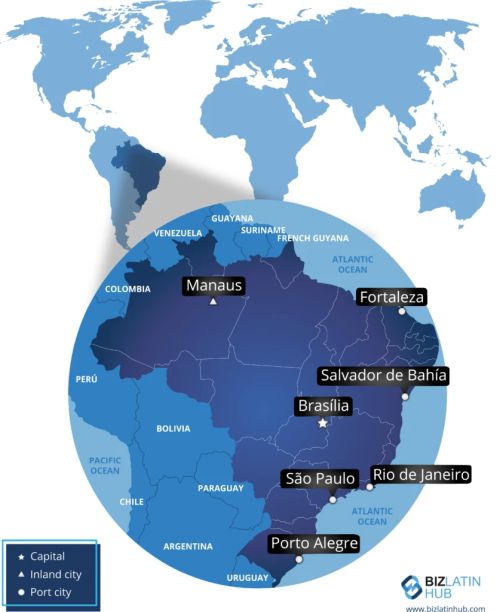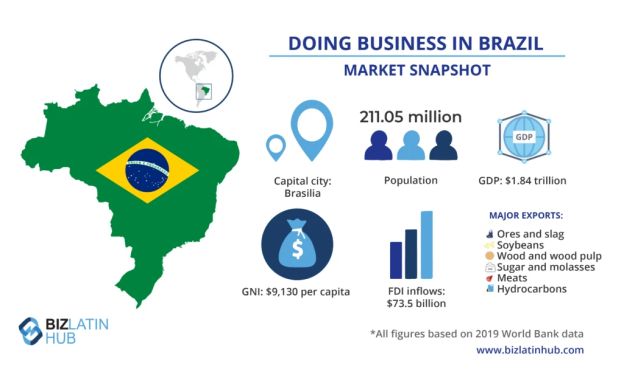If you are considering starting a business in Brazil and are already doing business elsewhere, you may find that your best option is to incorporate a branch.

Map of Brazil and its key cities
When you form a branch in Brazil, you enjoy the convenience of being able to offer a product or service already established elsewhere — meaning many elements of your value chain are already installed and you may already enjoy some product recognition in Brazil.
You also retain a greater degree of control over the operations and finances of a branch compared to a subsidiary in Brazil — however that also means a greater degree of liability in terms of debts and taxes, with the parent company of a branch fully liable for such burdens.
Brazil is well-known for having the biggest economy in Latin America by GDP, as well as being the region's largest country by area and most populous. Brazil's sheer scale, along with an abundance of natural resources, mean that a wide range of opportunities are on offer to investors in the country.
Being such an important source of raw materials and agricultural goods, Brazil is also a major hub for trade, and has a range of free trade agreements (FTAs) and preferential trade agreements in place, offering resident companies better access to key markets around the globe.
Many of those agreements come through the country's membership of the Southern Common Market (Mercosur) — a 30-year-old economic association that also includes Argentina, Paraguay, and Uruguay. Currently Mercosur is negotiating an FTA with the European Union — its biggest trading partner.
If you interested in entering this massive market and looking to register a branch in Brazil, it is worth keeping in mind that the country is known for its often complicated red tape, with administrative hoops to jump through at the local, municipal, regional, and federal level.
As such, if you form a branch in Brazil with no prior experience with the regulatory regime, and especially if your grasp of Portuguese is limited, you will need to find a local partner to support you in order to make sure that all processes are undertaken in the most efficient manner possible.
To incorporate a branch in Brazil, some essential steps must be undertakern and some basic requirements must be met. Below an overview of those nine steps is included.
If you would like to know more about how we can support you with market entry and ongoing operations in Brazil, contact us today.

A snapsht of the market in Brazil
Incorporate a branch in Brazil in 9 key steps
The process to incorporate a branch in Brazil involved the following nine steps:
Step 1: Request government authorization
The first step when you want to form a branch in Brazil is to request authorization from the Brazilian Federal Government, which must be granted before you can move on with the process.
Step 2: Request local tax numbers
Once the government has authorized you to register a branch in Brazil, the next step is for the company shareholders to obtain a Brazilian tax ID. For companies, this is known as the CNPJ, while for individuals this is the CPF.
Step 3: Register with financial authorities
Once the shareholders have obtained their identification numbers, they must be registered before the Central Bank and then before the Federal Revenue of Brazil.
Step 4: Appoint a legal representative
Once the shareholders have been registered before financial authorities, you must appoint a legal representative in Brazil via a power of attorney (POA).
Step 5: Draft the company bylaws
Once you have appointed a legal representative, they will be able to assist you with drafting the company bylaws, which is the next crucial step in the process to incorporate a branch in Brazil.
Step 6: Register the branch in Brazil
With the company bylaws drafted, you will be able to register the branch in Brazil before the local Trade Board, as well as other authorities.
Step 7: Open a corporate bank account
In order to form a branch in Brazil, you will need to have a corporate bank account for the entity, which can be opened once the registrations outlined in step five have been completed.
To complete this part of the process, the following documents will be needed:
- Documentation related to all shareholders
- Articles of incorporation
- Taxpayer IDs.
Step 8: Register the social capital
With the corporate bank account open, you will be able to move onto the next step, namely registering the entity's social capital with the Central Bank.
Step 9: Complete the process to incorporate a branch in Brazil by depositing the company capital
With all other steps completed, you will be able to finalize the process of registering your branch by depositing the initial company capital.
Additional information to incorporate a branch in Brazil
Appointment of a prosecutor

Your legal rep must be a Brazilian national or resident
A forieng firm is required to appoint a corporate and tax prosecutor to act as the company's legal representative in the country. This individual must be a Brazilian citizen or have a permanent visa and fixed residence in Brazil.
This individual plays a very important role in the company, as they have both legal and fiscal responsibilities before the Brazilian authorities.
After the appointment of the prosecutor, someone responsible should be chosen to administrate the company. They must also be a native Brazilian or have a permanent visa and a fixed residence in Brazil.
Legalization of documents of foreign partners
All original documents produced abroad must be approved by a Brazilian Consulate in the country in which they were issued. Approval must be issued by a Brazilian diplomatic representative.
To form a branch in Brazil, all documents issued are required to be legalized by the Ministry of Foreign Affairs.
Please note that some agencies or departments of the Brazilian Government require sworn translations by an officially registered translator.
Company and individual registrations
All companies that are created in Brazil must obtain a CNPJ identifiaction number, issued by the Secretariat of the Federal Revenue of Brazil.
All foreign partners must obtain a CPF identification number, the application for which can be initiated on the Federal Revenue of Brazil website in English, Spanish or Portuguese. The completed application document must be delivered along with copies of personal documents to a Brazilian consulate or embassy.
Statutes of the new company registration
For the branch of a foreign company to be established, it is necessary to write the company statutes based on all the legal standards required by the Brazilian authorities. These statutes shall include the likes of the entity's objectives, its registered company address, corporate capital, information related to its administration, and contractual clauses.
After the statutes of the company are finalized, they should be registered before public authorities, in order to facilitate the collection of taxes and duties by the Federal Revenue of Brazil.
Opening a business bank account in Brazil is an essential step to incorporate a branch
For companies or foreign partners to make financial movements, including investments, loans, or capitalization, a bank account must be opened with the Central Bank of Brazil, which regulates these records through the Electronic Declaratory Record (RDE).
Originally published 22 June 2018 | Updated On: 21 August 2022
The content of this article is intended to provide a general guide to the subject matter. Specialist advice should be sought about your specific circumstances.


